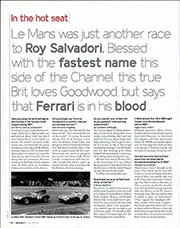
In the hot seat
Le Mans was just another race to Roy Salvadori. Blessed with the fastest name this side of the Channel, this true Brit loves Goodwood, but says that Ferrari is in…
The Model-A Ford
Sir,
I found the article on model-A Fords very interesting as from the middle ‘thirties until the outbreak of war I worked for a firm who ran a fair-sized fleet of these cars on self-drive hire.
As the horse-power tax was operative at that time, most of our cars were AF models with the 14.9 engines but otherwise they did not differ from the 24-h.p. job. Indeed, at least one taxation officer was quite unable to distinguish one from t’other.
The very early jobs in 1928 had side-mounted handbrakes and multi-plate clutches which proved almost indestructible on the extremely arduous type of duty our cars were used on. The 1929 version had a centrally located handbrake, so positioned that it was impossible to engage high or reverse gear with the brake on. The 14.9 version could not match its big brother for speed, but almost any of the models I had charge of would better 30 m.p.g. and one used to do a consistent 35 m.p.g. on long runs.
They were inclined to use up a lot of ignition condensers and I recollect running around for several weeks with a wireless condenser dangling from the distributor body. Another little icliosyncracy was for the hub of the camshaft gear to part company with the gear portion. This has kept me out of bed all night on a number of occasions when rectifying this on the roadside.
I can bear your contributor out as to the strength of the transmission. It was not unknown to be able to get two gears at once when the selectors became worn. If this took place in flight the result could be the splitting of the gearbox casing, but it was unusual for damage to occur to the gears themselves.
Axle shaft failure was rare and was usually the result of not keeping the nuts tight on the end of the shaft. It should be mentioned that no model-A had a straddle-mounted pinion, nor for that matter did the model-B, but except for early 1928 products, which had no pinion shaft lock nut, and were consequently prone to come undone, final-drive failure was no more prevalent than with contemporary Yank cars. I look back on the years I spent on the model-As with nostalgia. The cars had a maximum of engineering and a minimum of
frippery; they were full of character. I ruefully admit that it was often bad character, but character nonetheless. About the people who hired our cars I could write volumes but would probably be sued for libel and defamation of character!
Aston-on-Trent. GEORGE BAGGULEY.